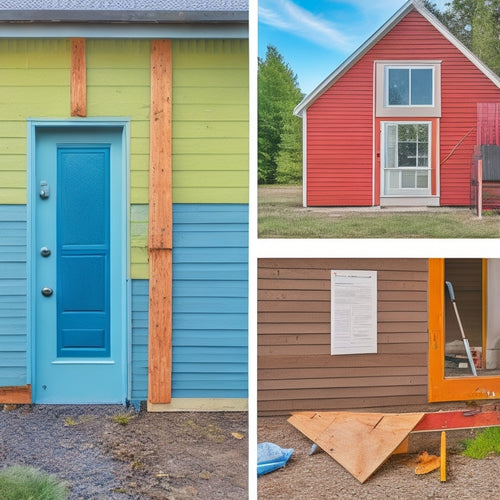
5 Best Local Regulations for Outdoor Renovation Projects
Share
When tackling an outdoor renovation project, you'll need to comply with local regulations that govern every aspect of your design. You'll require permits for constructing outdoor structures like decks, fences, and sheds, which guarantee safety and integrity of property and environment. Zoning laws dictate allowed uses, lot coverage, and setbacks, while environmental impact regulations aim to minimize harm to ecosystems and wildlife. Neighborhood covenants govern aesthetic and functional aspects of properties, and building codes dictate fence installation standards. Understanding these regulations is essential to avoid fines, project shutdowns, or required removal of structures – and there's more to explore when it comes to successfully maneuvering through these complex rules.
Key Takeaways
• Obtain necessary permits for outdoor structures to ensure safety, integrity, and compliance with local building codes.
• Understand local zoning laws to avoid violating setbacks, height limitations, and lot coverage restrictions.
• Comply with environmental impact regulations to minimize harm to ecosystems, wildlife, and natural habitats.
• Review neighborhood covenant restrictions to adhere to aesthetic and functional guidelines for properties.
• Research and comply with local building codes for fencing, including height, materials, and setback requirements.
Permits for Outdoor Structures
You typically need a permit to construct or install outdoor structures, such as decks, fences, or sheds, that are attached to your property or affect its footprint.
This is because these structures can greatly impact the safety and integrity of your property, as well as the surrounding environment.
When submitting a permit application, you'll need to provide detailed plans and specifications for your project, including materials, dimensions, and installation methods.
The purpose of this process is to guarantee structure safety and compliance with local building codes.
Zoning Laws for Backyards
Zoning laws for backyards dictate the allowed uses and restrictions for your outdoor space, governing aspects such as lot coverage, setbacks, and height limitations for structures. These laws vary by municipality, so it is important to familiarize yourself with your local regulations before starting your outdoor renovation project.
Understanding zoning classifications is significant, as they determine the allowed uses for your property. For instance, a residential zone may have different setback requirements than a commercial zone. You'll need to guarantee your project complies with the specific zoning laws in your area.
Here's a breakdown of common zoning laws for backyards:
| Zoning Classification | Setback Requirements | Height Limitations |
|---|---|---|
| R-1 (Residential) | 10 ft from property lines | 15 ft for sheds, 25 ft for decks |
| R-2 (Residential) | 15 ft from property lines | 20 ft for sheds, 30 ft for decks |
| C-1 (Commercial) | 20 ft from property lines | 30 ft for signs, 40 ft for buildings |
| A-1 (Agricultural) | 50 ft from property lines | 25 ft for barns, 40 ft for silos |
| Historic District | Varies by district | Varies by district |
Remember to consult your local government's website or contact their zoning department to determine the specific regulations for your area.
Environmental Impact Regulations
Environmental impact regulations dictate the measures you must take to minimize harm to ecosystems and wildlife during your outdoor renovation project.
As you plan your renovation, it's crucial to take into account the environmental consequences of your actions. You must guarantee that your project doesn't disrupt natural habitats or contaminate soil and water sources. This means adopting sustainability practices that reduce waste, conserve resources, and promote eco-friendly materials.
You'll need to assess the potential impact of your project on local wildlife and take steps to preserve their habitats. This might involve creating wildlife corridors, installing bird-friendly windows, or implementing noise reduction measures to minimize disturbance.
Additionally, you should take into account the long-term effects of your project on the local ecosystem, including the potential for invasive species or climate change.
Neighborhood Covenant Restrictions
While guaranteeing your outdoor renovation project meets environmental impact regulations, it's equally important to contemplate the neighborhood covenant restrictions that govern the aesthetic and functional aspects of your property.
These restrictions can greatly influence your renovation plans, so it's vital to understand what's allowed and what's not. Review your neighborhood's covenant documents to determine the specific guidelines that apply to your property.
Pay particular attention to landscaping guidelines, as these can dictate everything from tree placement to lawn maintenance. Covenant enforcement can be strict, so it's imperative to comply with these regulations to avoid costly fines or even project shutdowns.
Additionally, consider working with a landscape architect or designer who's familiar with local covenant restrictions to guarantee your renovation plans meet the necessary standards.
Building Codes for Fencing
Installing a fence as part of your outdoor renovation project requires compliance with local building codes, which dictate everything from fence height and material to setback requirements and decorative elements.
You'll need to research the specific codes in your area to guarantee your fence meets all the necessary standards.
When it comes to fence materials, you'll need to choose from options that meet local building codes. For example, some areas may require fences to be made from durable materials like wood or metal, while others may allow for more decorative options like vinyl or composite materials.
Be sure to check the codes to determine which materials are acceptable in your area.
Height requirements are another vital aspect of building codes for fencing. You'll need to verify your fence meets the minimum and maximum height requirements, which can vary depending on the type of fence and its location.
For instance, a fence surrounding a pool may have different height requirements than one surrounding a residential property.
Frequently Asked Questions
Can I Renovate My Outdoor Space During Weekends or Evenings?
When planning your outdoor project, you'll want to know if you can renovate during weekends or evenings.
Check your local ordinances for weekend work hours, as some areas restrict outdoor construction to weekdays only.
Additionally, familiarize yourself with outdoor project restrictions, such as noise ordinances or permits required for specific types of work.
You'll avoid potential fines or project delays by knowing these rules before you start.
How Do I Handle Noise Complaints From My Neighbors?
Are you prepared to face the music when your neighbors start complaining about the noise?
You'll need to mitigate the noise level by scheduling noisy tasks during less intrusive hours, using noise-reducing materials, and creating a buffer zone.
Don't wait for complaints to arise - proactively communicate with your neighbors about your renovation plans and schedules.
Transparency and consideration will go a long way in resolving potential issues before they escalate.
Are There Incentives for Eco-Friendly Outdoor Renovation Projects?
You're likely wondering if going green with your outdoor renovation project will pay off. The answer is yes!
By incorporating eco-friendly materials into your design, you can tap into government incentives. For instance, you may be eligible for tax rebates or credits for using sustainable materials or energy-efficient systems.
Research local and national programs to see what benefits you can reap.
Can I Hire an Unlicensed Contractor for Small Outdoor Jobs?
When considering hiring an unlicensed contractor for small outdoor jobs, you need to weigh the risks.
If something goes wrong, you'll be left holding the bag, as unlicensed contractors often lack contractor liability insurance.
Additionally, they mightn't obtain necessary project permits, putting you at risk of fines and legal issues.
It's crucial to prioritize your project's integrity and your own protection by hiring a licensed, reputable contractor who can guarantee compliance and mitigate potential risks.
Do Outdoor Renovation Projects Affect My Property Taxes?
When you commence outdoor renovation projects, you're not only enhancing your property's curb appeal, but also potentially impacting your wallet.
You're likely wondering, do these projects affect your property taxes? The answer is, it depends on your location.
Typically, a property tax assessment is based on the property's value, and renovation cost can increase that value, resulting in higher taxes.
However, some areas offer exemptions or rebates for certain improvements, so it's crucial to research the specifics in your area.
Conclusion
As you begin your outdoor renovation project, remember that local regulations are the unsung heroes that keep your community safe and beautiful.
Like a master puzzle, each regulation fits together to create a harmonious whole.
By understanding and complying with these rules, you'll avoid costly mistakes and guarantee your project is a masterpiece that enhances your property and neighborhood.
So, take the time to navigate these regulations and reap the rewards of a successful renovation.
Related Posts
-

7 Patio Safety Tips for DIY Renovation Projects
As you begin your DIY patio renovation project, prioritize safety by evaluating the worksite for tripping hazards and...
-

Why Exterior Wall Renovation Requires a Plan
You're about to commence a complex and potentially costly project when you decide to renovate your exterior walls, an...
-

What to Look for in Pneumatic Renovation Tools
When selecting pneumatic renovation tools, you'll want to take into account several key factors to guarantee optimal ...


